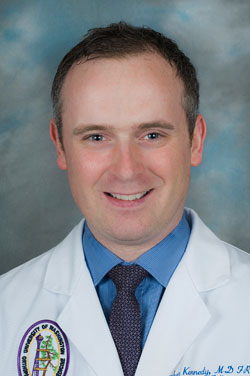
STEPHEN KENNEDY
MD, FRCSC
UBC Orthopaedics Residency Program, 2011
Hometown:
Nanaimo, BC
Current Location:
Seattle, WA
Why did you choose the UBC Orthopaedics Residency Program?
I chose the UBC program for multiple reasons. It is a large well-rounded department, with internationally recognized faculty in every division. I knew these connections would give me a wealth of opportunities upon graduation. Through shadowing and clinical electives, I could see mentors that I admired and wanted to emulate, and would later model my career afterward. The fellows and residents were very supportive, and I knew these were people I could work with for 5 years.
What do you consider some of your greatest achievements to date?
As an academic faculty member at the University of Washington, I am most proud of the contributions I have been able to make to the education of our residents and fellows. Last year, I was proud to be promoted to Associate Professor, and was made Associate Program Director for the residency program. I have been selected by my peers in Seattle as a “Top Doctor” for the last 6 years. I was also selected by the American Society for Surgery of the Hand as a “Young Leader” in 2017, and was able to contribute to quality improvement projects on a local and national level.
Tell us about your career journey after graduation.
During residency, I developed an interest in upper extremity surgery, and did a 2 month research elective at Massachusetts General Hospital, which confirmed my interest. My first fellowship after graduation was in Hand & Microvascular Surgery at the University of Washington in Seattle. I did not plan to stay in the U.S., but shortly after starting my fellowship, I became passionate about the mission of this high volume trauma center covering a five state area, and the ability to use orthopaedic and plastic reconstructive surgery techniques in a combined service to restore function for patients with severely traumatized upper extremities. I was recruited to join the faculty. After that, I did a 6 months Sports Medicine and Upper Extremity Fellowship at the PanAm Clinic in Winnipeg, which allowed me to contribute advanced arthroscopic skills and elbow reconstruction techniques to my group.
What are some of the most rewarding aspects of your chosen career path?
I feel very fortunate with my career path in terms of challenging clinical work, education, and research. Clinically, I use creative techniques to reconstruct the upper extremity including bone reconstructive techniques, microvascular surgery, arthroscopy, arthroplasty, tendon transfers, microsurgical nerve transfers, and flaps. In terms of education, I get to play a role in the education of fellows, senior residents, junior residents and medical students, and I get to help steer the program as an Associate Program Director. In research, I have the opportunity to collaborate with researchers from a large institution, and I’m enjoying what I am studying right now, which is evidence based practice and surgical simulation.
What advice would you give to current residents in the program?
One thing that I learned through my experience as a UBC resident is the importance of staying open to different opportunities. As a resident I never imagined that I would move permanently to the U.S., but it ended up being the best move for my career and family. Considering this as an option earlier might have made the process easier. When I was being selected for fellowships and jobs, I was also struck by how many interconnections there are in orthopaedics. Often the strongest endorsements for career advancement come from “off-the-record” recommendations from staff that are not on the official list of referees. More than once, the endorsements from off-service faculty and support staff have made important influences on my career.
Connect with Stephen: